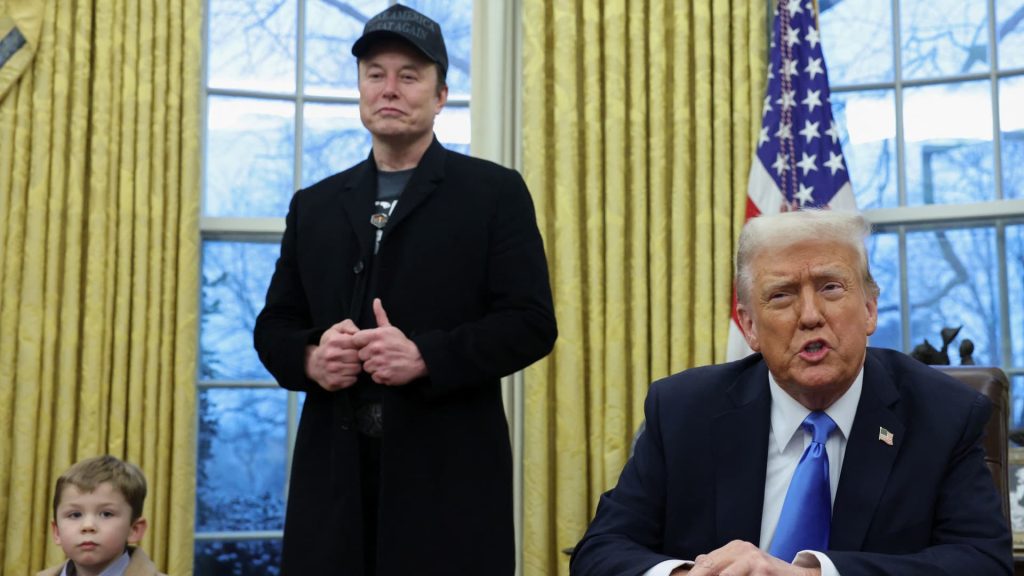In a recent announcement, U.S. President Donald Trump expressed his consideration of distributing a portion of the savings generated by the Department of Government Efficiency (DOGE) to American citizens. Speaking at the FII Priority Summit in Miami Beach, he stated that 20% of the savings could potentially be allocated to taxpayers, while the remaining portion would be directed towards reducing the national debt. This proposal follows an initiative suggested by entrepreneur Elon Musk, who aims to cut Federal spending significantly.
| Article Subheadings |
|---|
| 1) Background of the Proposal |
| 2) Details of the Savings |
| 3) Political Implications |
| 4) Current Challenges Faced by DOGE |
| 5) Summary of Future Steps |
Background of the Proposal
The concept of utilizing efficiency savings to benefit American taxpayers is not entirely new but has garnered fresh attention in light of Trump’s remarks. The idea emerged during discussions centered around the cost-cutting initiatives put forth by the DOGE advisory group. This campaign aims to streamline government operations and reduce expenditures, and Trump’s proposal to share these savings with citizens could represent a significant shift in fiscal policy. His comments during the FII Priority Summit in Miami Beach, Florida, indicated a willingness to distribute funds directly to taxpayers, which reflects a populist approach to governance that aims to uplift American households financially.
Details of the Savings
According to Trump, a substantial amount of savings has been generated by DOGE’s initiatives, with estimates suggesting that the department has saved approximately $55 billion. However, a closer examination reveals discrepancies that raise questions about the accuracy of these savings. Reports indicate that only $16.6 billion of this figure has been confirmed, casting doubt on the total amount claimed. Furthermore, some reports detail an error where an $8 billion saving was cited for a contract that was later revealed to involve only $8 million. This inconsistency has sparked discussions about the credibility of DOGE’s reporting and the implications for taxpayers who may ultimately be affected by these changes.
Political Implications
The political ramifications of Trump’s announcement could be significant, particularly as it attempts to merge issues of fiscal conservatism with direct financial aid to American households. By proposing to distribute a large portion of federal savings directly to taxpayers, Trump is re-engaging with themes that resonated during his previous campaigns. This proposal could also serve to bolster support from his political base, especially among those who may feel the sting of economic hardship. Innovative policies like these may impact how American citizens perceive the role of government, particularly in times of economic distress, creating opportunities for discussion surrounding government accountability and responsible spending.
Current Challenges Faced by DOGE
Despite the potential financial benefits of Trump’s proposal, DOGE has encountered several legal and procedural challenges as it tries to implement its efficiency measures. A federal judge recently denied requests to halt DOGE’s access to federal agency computer systems, which suggests ongoing litigation will not impede its immediate operational capabilities. However, the challenges and scrutiny surrounding DOGE’s savings claims may hinder the credibility of the initiative and its perceived benefits to the public. The complexities involved in establishing a clear and reliable savings figure may add an additional layer of complexity to any proposals for tax refunds or financial distributions. Moreover, these challenges cast a shadow over the ambitious third-party endorsements from business figures like Elon Musk, who have advocated for these initiatives.
Summary of Future Steps
Looking forward, the proposed distribution of savings will likely require thorough analysis and oversight to ensure accountability and to substantiate the actual savings figures cited by DOGE. If officials move forward with the plan, there will be crucial discussions to define the specific mechanisms for distributing any savings and how this will align with the overarching goal of reducing the national deficit. Moreover, continued collaboration with key stakeholders, including financial experts and legislators, will be necessary to address both the potential benefits and the implications of a DOGE Dividend. The dialogue surrounding this proposal is expected to evolve, especially as voters and policymakers deliberate its overall impact on American households.
| No. | Key Points |
|---|---|
| 1 | Trump considers allocating 20% of DOGE savings to American taxpayers. |
| 2 | DOGE claims to have saved $55 billion, though accuracy is questioned. |
| 3 | Political implications of direct payments to citizens are significant. |
| 4 | Legal challenges face the implementation of DOGE’s efficiency measures. |
| 5 | Future discussions needed on distribution methods and accountability. |
Summary
In summary, President Trump’s consideration to distribute a percentage of the Department of Government Efficiency’s savings to American citizens signifies a bold shift in fiscal policy aimed at alleviating economic burdens. While the proposal presents an innovative approach to engage taxpayers, the discrepancies in reported savings figures and ongoing challenges faced by DOGE underscore the complexities inherent in execution. Continued scrutiny and dialogue will be essential as stakeholders navigate the implications of such financial initiatives moving forward.
Frequently Asked Questions
Question: What is the DOGE initiative?
The DOGE initiative focuses on identifying and implementing efficiency measures within the federal government to reduce unnecessary spending.
Question: How does Trump’s proposal benefit taxpayers?
Trump’s proposal suggests that up to 20% of the savings generated by DOGE could be refunded to taxpayers, potentially providing financial relief to households significantly.
Question: What challenges does DOGE currently face?
DOGE faces legal challenges and scrutiny regarding the accuracy of its reported savings, which may complicate efforts to implement its efficiency initiatives and fulfill promises to taxpayers.
